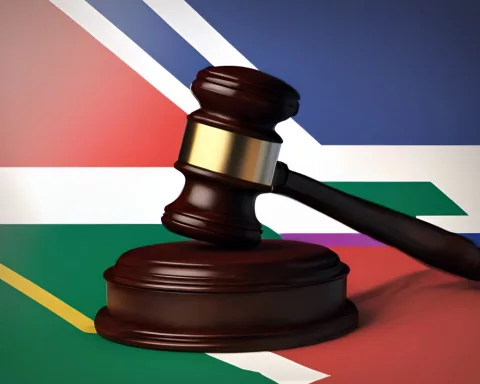The committee has the power to explore other parts of the legislation not initially covered in the Bill. The committee has deferred some proposed amendments to the Seventh Parliament for further processing. This milestone underscores the committee’s dedication to ensuring the General Intelligence Laws Amendment Bill serves the best interests of the public while accurately reflecting the nation’s Constitutional mandates.
Legal Advice and Committee’s Authority
The Committee on General Intelligence Laws Amendment Bill has the legal authority to scrutinize proposed legislative amendments and explore other parts of the legislation not initially covered in the Bill. However, these actions must align with the public participation process and only be implemented after obtaining the National Council of Provinces’ approval. The committee has deferred some proposed amendments to the Seventh Parliament for further processing.
In a significant development, the Committee on General Intelligence Laws Amendment Bill has unanimously approved its Report on the Bill. This notable decision came after the committee sought legal advice from the Parliamentary Legal Services. The purpose of seeking counsel was to understand if the committee had the power to scrutinize parts of the legislation that were not included in the Bill initially when the National Assembly submitted it to the National Council of Provinces (NCOP).
Legal Advice and Committee’s Authority
The legal advice provided to the committee highlighted a critical fact. According to section 44(1)(b)(iii) of the Constitution, the committee has the legal authority to create laws and make decisions regarding proposed legislative amendments. However, the committee’s actions should always align with the public participation process. This principle was underscored by the Constitutional Court in the verdict of the Doctors for Life case.
Further clarity provided in the legal advice emphasised the committee’s power to explore other parts of the legislation not initially covered in the Bill. The NCOP Rules grant the committee the ability to propose such amendments. But it should be noted that these amendments can only be implemented after obtaining the Council’s approval.
Potential Courses of Action and Future Directions
In addition to this, guidance was provided to the committee regarding the potential paths it can take in processing the Bill. Options included either seeking permission from the NCOP to investigate the proposed amendments to the Bill as referred, or deferring the amendments to the 7th Parliament.
After careful consideration, the committee agreed to direct the following issues to the Seventh Parliament for further processing:
- Proposal to amend the Secret Services Act 56 of 1978 to establish the Evaluation Committee within 12 months.
- Selection process for the Deputy Chairperson for the Joint Standing Committee on Intelligence (JSCI).
- The need for bi-annual meetings between the JSCI and the President concerning intelligence matters.
- The proposed alignment of the JSCI’s annual reporting with parliamentary reporting requirements.
- The appointment procedure of the Deputy Inspector-General of Intelligence (DIGI).
- The proposal to grant JSCI the authority to assign the IGI to carry out a specific oversight function.
Impact and Significance of the Committee’s Decision
Following these developments, the committee’s report will be featured in the Parliament Announcements, Tablings and Committee Reports. As a result, the NCOP will consider the Report on the Bill. Pursuant to Section 75 of the Constitution, the Bill will then be forwarded to the President for assent.
This milestone in the legislative process underscores the committee’s commitment to a comprehensive examination of the Bill. The committee has shown a determination for transparent operation in complicated policy work and a dedication to adhering to the principles of public participation and legislative propriety. The thorough deliberation process undertaken by the committee reflects their commitment to ensuring the General Intelligence Laws Amendment Bill serves the best interests of the public while accurately reflecting the nation’s Constitutional mandates.
1. What is the Committee on General Intelligence Laws Amendment Bill?
The Committee on General Intelligence Laws Amendment Bill is a legislative committee tasked with scrutinizing proposed amendments to the General Intelligence Laws Amendment Bill and exploring other parts of the legislation not initially covered in the Bill.
2. What legal authority does the Committee have?
According to section 44(1)(b)(iii) of the Constitution, the committee has the legal authority to create laws and make decisions regarding proposed legislative amendments. However, their actions should always align with the public participation process.
3. Can the Committee explore parts of the legislation not initially covered in the Bill?
Yes, the committee has the power to explore other parts of the legislation not initially covered in the Bill, according to the legal advice provided to them. However, these amendments can only be implemented after obtaining the National Council of Provinces’ approval.
4. What are the potential courses of action and future directions for the Committee?
The committee can either seek permission from the National Council of Provinces to investigate proposed amendments to the Bill as referred or defer the amendments to the 7th Parliament. The committee has already deferred some proposed amendments to the Seventh Parliament for further processing.
5. What issues have been deferred to the Seventh Parliament for further processing?
The issues that have been deferred to the Seventh Parliament for further processing include the proposal to amend the Secret Services Act 56 of 1978 to establish the Evaluation Committee within 12 months, the selection process for the Deputy Chairperson for the Joint Standing Committee on Intelligence (JSCI), the need for bi-annual meetings between the JSCI and the President concerning intelligence matters, the proposed alignment of the JSCI’s annual reporting with parliamentary reporting requirements, the appointment procedure of the Deputy Inspector-General of Intelligence (DIGI), and the proposal to grant JSCI the authority to assign the IGI to carry out a specific oversight function.
6. What is the significance of the Committee’s decision and what happens next?
The committee’s decision to unanimously approve its report on the Bill is a significant milestone in the legislative process. The report will be featured in the Parliament Announcements, Tablings and Committee Reports, and the National Council of Provinces will consider it. Pursuant to Section 75 of the Constitution, the Bill will then be forwarded to the President for assent. This reflects the committee’s commitment to ensuring the General Intelligence Laws Amendment Bill serves the best interests of the public while accurately reflecting the nation’s Constitutional mandates.












